At first, they did not believe in the success of startups like Airbnb and Uber – who wants to stay for the night in the house of a stranger or drive with an unknown person instead of a trusted taxi driver? Many venture capitalists refused to invest in these companies. However, their rise paved the way for many others. One by one, car-sharing companies, parking spaces and even kitchens began to appear, and for a long time no one took up warehouse space. Is it really possible to interest someone in the idea of storing your things in someone else's house? A former poker pro who won $1.7 million in a European tournament in 2008 and went bankrupt just a couple of years later took a chance on giving her a chance.
I have been very ambitious since childhood. Once I told my dad that I wanted to become a very rich lawyer, to which he replied that I could not imagine the difficulties that would stand in my way. I could never understand why people choose such a negative attitude towards life. The dream should not be destroyed but nourished. However, this attitude did not stop me.
I grew up in a very poor area, although my parents were middle-class. In elementary school, at 9 or 10 years old, I was almost the only one in the class who had a color printer at home. The Pokémon boom was in full swing, all the kids dreamed of Pokémon posters. I collected applications, printed out pictures at home, and sold them for a dollar a piece. I made $1,000 in a month. I had two pencil cases: in one I carried pencils, in the other I carried cash. One day, my mother found my stash and for some reason got terribly angry when I told her about my enterprise. And I could not understand what the problem was – they still win! Kids love Pokémon, can afford to spend a dollar, and I make money on it! But she demanded that I return the money to all my customers. In my opinion, this is quite typical of Quebec culture – for some reason, French-speaking Canadians look askance at ambitious people and those who do business, consider them almost scammers. Unclear! Well, I cried a little and gave everything back.
In high school, I had excellent grades, although I hardly tried, but I hated school. I had a severe hip fracture, and for two whole years, I could only walk on crutches. I didn't have any friends, I became interested in video games – World of Warcraft, Counter-Strike, and got very fat. I am a very passionate person and I give myself 110% to what I do, so I devoted all my free time to games. Only in my last year of school, when I got rid of crutches, I started to play sports and lost some weight.
I went to university to study psychology, but I learned about poker in my freshman year. ESPN showed the World Series, which was won by Chris Moneymaker, the first real amateur to become world champion. He looked stupid, and if such a person can win at poker, I certainly can! I began to devour books and forums fanatically, dropping out of university and depositing $50 off my mom's credit card at Paradise Poker.
For people who don't know what poker is, I explain that this is chess with an element of luck, and therefore there is money in it. In chess, a stronger player will beat a weaker player 99 times out of 100. In poker, everything is different, and even a weak player has a chance. Because of this, many engage in self-deception: they attribute their victories to skill, and their defeats to bad luck.
I told my mom that I was going to drop out and become a poker pro. She replied: if you quit studying, go live with your father. (They had divorced the year before.) Okay, no problem. I moved in with my dad in a small town near Sherbrooke where I didn't know anyone, which suited me perfectly because I wanted to focus entirely on playing online. I didn't have my own money; when my grandma gave me $80 to buy myself some food, I put it in my account in the room. On my first day at my new location, I won a tournament at Party Poker for about $1,500. Good sign!
I grinded 12-14 hours every day. I read, played, discussed poker, and improved all the time. Two months later my bankroll was over $10,000. I'm only 17, and I'm already helping my father pay the rent! Soon we moved to Montreal because I learned the addresses of underground live poker clubs. During the day I played online, at 7 pm my dad took me to the poker room, had dinner there, and played until 3-4 in the morning. I was consistently taking out $1,000-$1,500 a night. The average level there was even lower than on the Internet. People just donated money.
Then I became friends with a strong poker player named Eric, who will help me start Sharebee in the future. We communicated well online and at some point decided to grind together. I moved in with him in Laval and got into an even crazier grind than before.
My bankroll was around 40k when I turned 19 and we decided to celebrate with a trip to a tournament in Europe for the European Poker Tour. This was the third airplane flight in my life (the first time I flew to the Bahamas on the PCA when I was 18).
We flew to San Remo and got to know the other players who had qualified via satellites at PokerStars. Among them was the American Jason Mercier from Florida, the owner of the Supernova Elite status. To achieve this, he simultaneously played 24 tables for 12 hours a day and played two million hands in a year. (When you get to a more or less decent level, 90% of the decisions are made automatically.) Jason and I drank heavily and agreed to exchange 10% with each other in this tournament. Swapping stakes with a player you respect was standard practice to reduce risk.
He won this tournament.
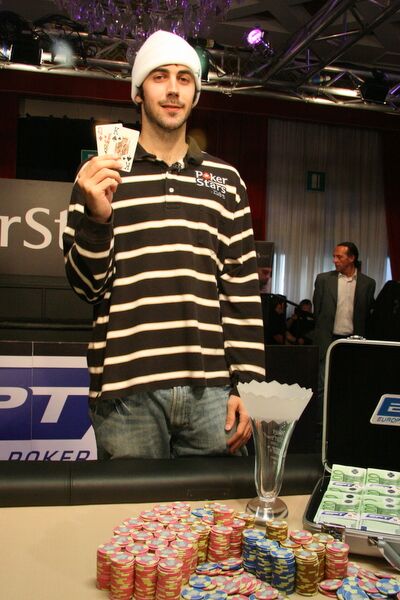
His prize was in the area of $1.3 million, I got 10%. I myself got to the third day, went far enough, but dropped out early in the money.
Having received such an increase in my bankroll, I went to play at higher limits – NL1k, NL2k, and multi-tabled 10 tables at once. Not sure if it was a wise decision, but I've never been shy about taking risks. I believe that the one who never risks is the one who risks the most. Daily swings could be $15-20k.
After playing another tournament in Italy, I parted ways with my buddies Eric and Antoine (another future Sharebee investor!). They returned to Canada, and I decided to take part in the biggest tournament of the series – the EPT final in Monaco. The entry fee was €10k, which was a bit expensive for me (preferably having a bankroll of at least 100 buy-ins), so I sold 50%.
I went to Monaco alone on a night train that ran for nine hours, and in the morning I realized that I was getting sick. However, I immediately started to feel really good, and I played great, so by the fourth day I was one of the chip leaders. I started playing big pots against the poker stars of the time, sitting with Full Tilt and PokerStars stickers, and knocked them out one by one. My speech play began to attract attention and the fact that I refused to give my online nickname, which only fueled the interest of journalists.
Meanwhile, I developed a fever – the disease intensified. I played the final table with a temperature of 100.5. From time to time I went to the toilet – I felt sick. By some miracle, I managed to take 3rd place and received $1.7 million. At the same time, I was terribly unlucky in the end!
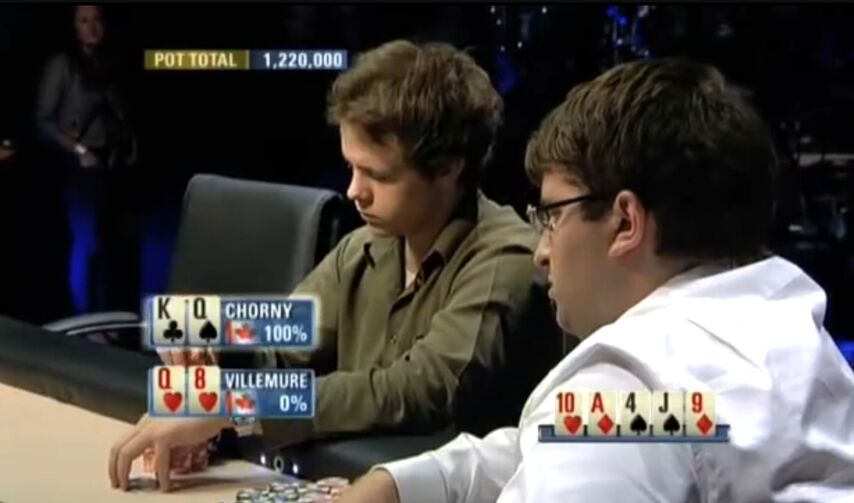
A recording of the tournament can be found on YouTube. Even with the shares sold, I practically became a millionaire at 19.
I started a completely crazy life with a lot of fun and very little poker. I spent money at a breakneck pace, but I had absolutely no doubt that I could win more. A very unreasonable approach, of course, but I was very arrogant and did not listen to anyone. I didn’t even buy real estate, although I thought about it and was close to buying.
So several years passed, during which I completely lost my passion for poker. I wanted to do something useful for the world, and poker is just a race for money. I no longer felt the desire to run to the tables, wake up in the morning, and grind for 14 hours. I continued to play, but not so intensively and not so strongly, more casually. And by about age 23, my bankroll was gone. It's interesting that most of my poker friends who didn't have big success were grinding quietly in the golden years of online and are now very rich.
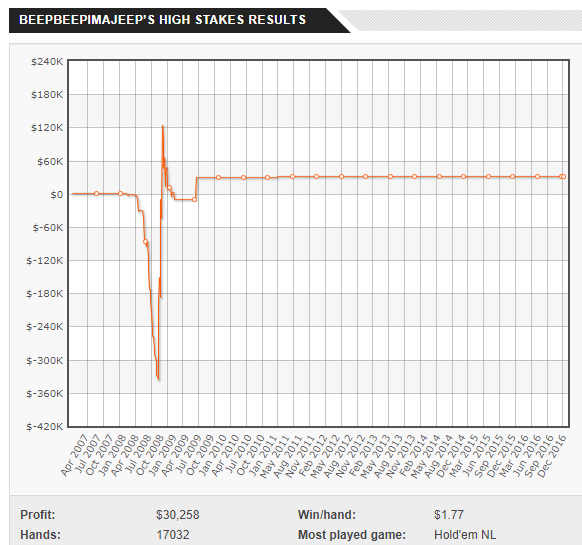
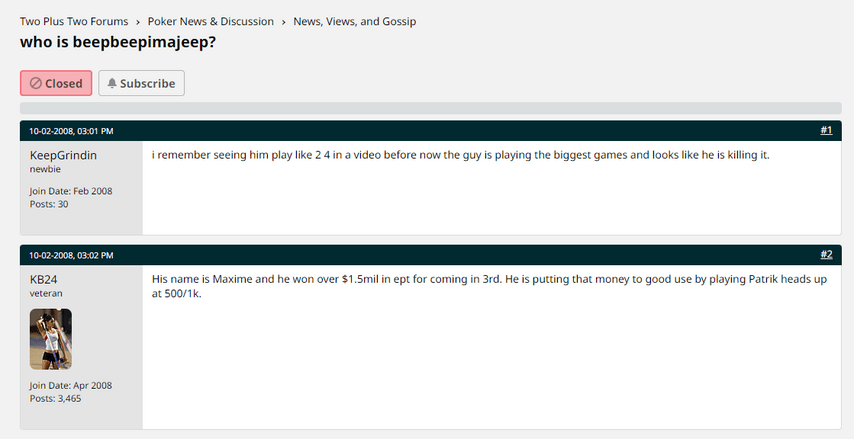
Who is beepbeepimajeep? I remember that I played 2/4 on the video, and now I'm sitting in the most expensive game and it looks like I'm tearing up.
His name is Maxim. He won over 1.5 million on EPT for 3rd place. He has put his money to good use and is playing heads-up with Patrick for 500/1k.
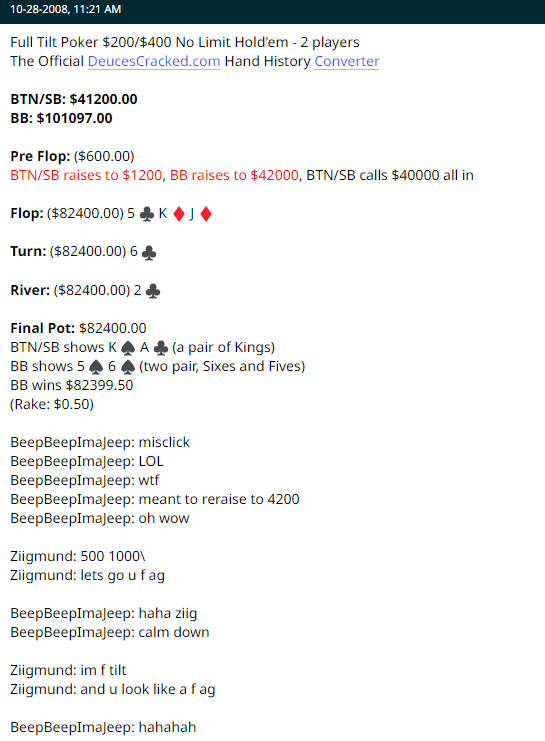 Misclick preflop vs Ilari Sahamies
Misclick preflop vs Ilari SahamiesAround the same time, I met a girl whom I am now married to. Soon our first child was born. I had no money, I categorically did not want to make money with poker, but I had no experience of any kind of work. True, over the years I graduated from the university, where I studied the philosophy of science – simply out of pure interest in the subject.
Once a meat seller came up to our front door. We talked, I bought 40 pounds and found out that he is the founder of a startup that delivers meat from Quebec farms directly to customers, bypassing stores. It was an innovative concept, I liked it. I asked if he was looking for employees, mentioning that my sister was looking for work. My ego was too vulnerable! A week later I came to his office and got a job. I became his first employee.
For six months I went from house to house and sold meat to people, there were only 5% refusals! Then, when we expanded, he became the director of logistics. Two and a half years later, the company already employed 75 people.
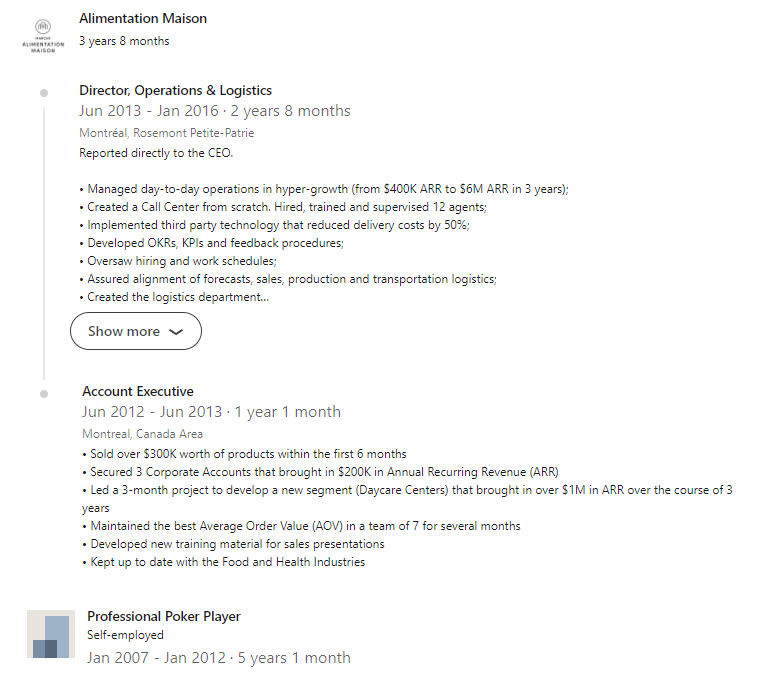 Work resume of Maxime Villemure
Work resume of Maxime VillemureI did not have a share in the business, and at some point, our paths with the owner diverged. I learned a lot from him and am very grateful for everything, but it was time to move on. At the new place of work, my salary doubled, but the product was not so interesting – we delivered work clothes to factories. I worked there for six months before receiving a business certificate from McGill University. In May 2016, I had the idea for Sharebee.
My wife was expecting a second child, and we decided to move into a bigger house. We liked a great house with just a huge garage. Standing in this garage, I thought: what should I do with this useless space for us? Maybe furnish a room and rent it out through Airbnb? But who wants to live in a garage? Then the thought came: maybe store other people's things there? Set up a warehouse? And I got hooked on this idea. I had a negative experience of interacting with warehouses, I knew that it is very expensive and inconvenient for us, and the service is simply terrible. The whole system can certainly be significantly improved.
I Googled three similar startups in France and just one in North America. There were a couple of unsuccessful attempts, but they just started too early, when the market was not yet ready for it. I wrote a business plan, took it to Antoine (my poker buddy and good friend), and he immediately gave me $100,000 for it.
I had no experience writing software, but I pitched my startup idea to a couple of engineers from a new job and they wanted to get involved. One of them became my service station, and the second – CMO.
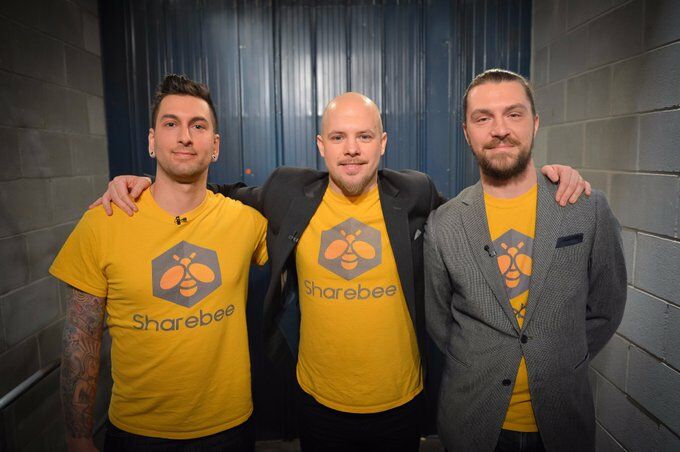
We equipped the first warehouse in my garage and easily found the first customers with the help of cold calls. We quickly wrote very primitive software in order to launch as soon as possible and start receiving money. A month after the start of work, we already had 10 customers paying through the platform. By the way, I still actively use my service and sell space not only in the garage, but also in the basement.
The key issue that needed to be addressed was insurance – both for stored items and for the property itself. We managed to get the largest insurance company in Canada very quickly interested, and after a year and a half, all our problems were solved. They created a unique insurance product, the first in the world, which insured the risks of both owners and clients for $500k and $250k, respectively. After that, all transactions through Sharebee were insured.
The price depends on the rented footage and storage conditions – the availability of security, heating, etc. My garage and basement are not available to customers 24/7 – in order to come pick up their things, the client must make an appointment. Other conditions can be ordered on our platform, but most customers do not need round-the-clock access, and this scheme suits them just fine. Usually, they leave things for long-term storage, and then, when they are ready, they take everything away and make room for the next client. The cost of warehouse services through Sharebee is about two times lower than in traditional warehouses, and geographically decentralized warehouses are often much more convenient – we have several thousand storage points. This is a major competitive advantage. And the owners of the sites, with a minimum of effort on their part, receive an additional $1,000-$1,500 per month. In fact, they meet with the client twice – at the time of import and export. All transactions go through the online platform.
What do we keep? Furniture, boxes with things, appliances, mattresses... Motorcycles, jeeps, minivans, boats... In general, the system is very flexible, traditional warehouses often do not provide such opportunities.
The hardest part was finding enough demand. We quickly gained enough space – people were ready to rent out free space, because for them it's a freeroll: if customers come, they will have money, but if they don't, they don't lose anything. However, there were few clients. I had to get serious about digital marketing. We've done keyword research on Google so that people who want to store things can find our offer. About a year later, these efforts finally began to bear fruit, and supply and demand more or less balanced. We now have eight employees, 400 active leases, and about 2,000 available storage locations in three cities.
When I was 19, I was a millionaire. Now I am not a millionaire, although I plan to become one again. But money is not the goal. When I was richer, I wasn't happy. Money is most often a side effect of the good we bring to the world. The more value I bring to my clients, the more money I can earn for myself.
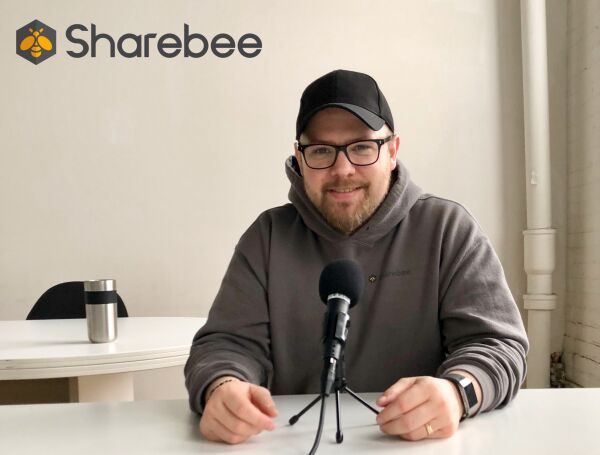
Source: Montreal Startup Podcast
